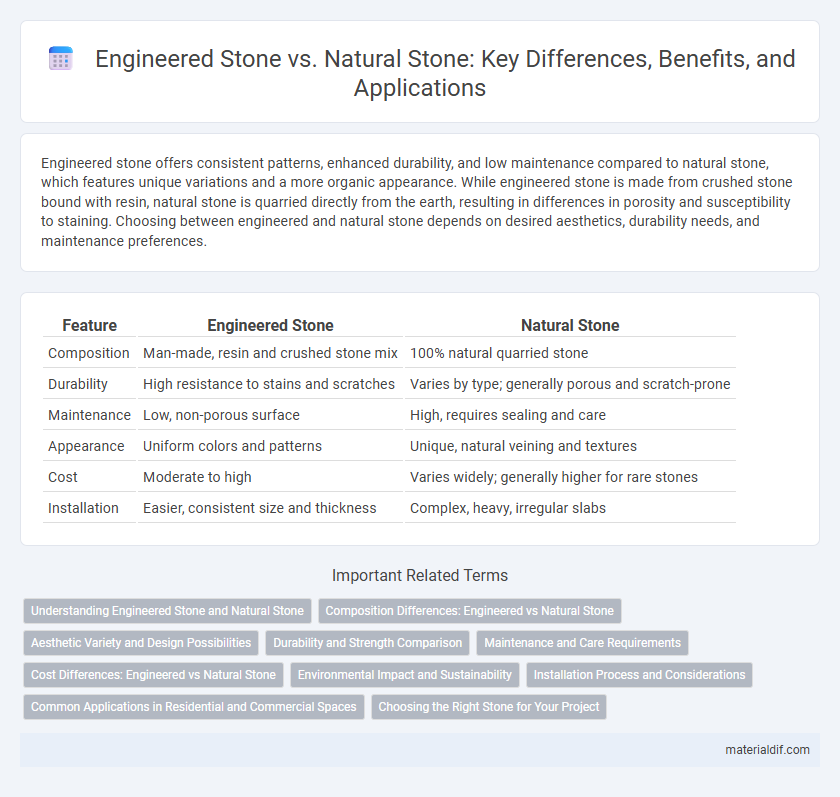Engineered stone offers consistent patterns, enhanced durability, and low maintenance compared to natural stone, which features unique variations and a more organic appearance. While engineered stone is made from crushed stone bound with resin, natural stone is quarried directly from the earth, resulting in differences in porosity and susceptibility to staining. Choosing between engineered and natural stone depends on desired aesthetics, durability needs, and maintenance preferences.
Table of Comparison
| Feature | Engineered Stone | Natural Stone |
|---|---|---|
| Composition | Man-made, resin and crushed stone mix | 100% natural quarried stone |
| Durability | High resistance to stains and scratches | Varies by type; generally porous and scratch-prone |
| Maintenance | Low, non-porous surface | High, requires sealing and care |
| Appearance | Uniform colors and patterns | Unique, natural veining and textures |
| Cost | Moderate to high | Varies widely; generally higher for rare stones |
| Installation | Easier, consistent size and thickness | Complex, heavy, irregular slabs |
Understanding Engineered Stone and Natural Stone
Engineered stone is composed of crushed natural quartz mixed with resin and pigments, resulting in a durable, non-porous surface ideal for countertops and flooring. Natural stone, such as granite, marble, or limestone, is quarried directly from the earth and exhibits unique patterns and variations due to its mineral composition. The main distinctions lie in engineered stone's uniform appearance and low maintenance versus natural stone's natural beauty and potential porosity requiring sealing.
Composition Differences: Engineered vs Natural Stone
Engineered stone consists primarily of crushed natural quartz mixed with resin and pigments, resulting in a consistent, non-porous surface with enhanced durability and stain resistance. Natural stone, such as granite or marble, is formed through geological processes, exhibiting unique mineral compositions and natural variations that can include porous structures prone to staining and weathering. The engineered composition allows for greater customization in color and pattern, while natural stone maintains its one-of-a-kind aesthetic linked to its mineral diversity and formation environment.
Aesthetic Variety and Design Possibilities
Engineered stone offers a broader aesthetic variety with consistent colors and patterns, allowing for precise customization that natural stone cannot always achieve. Natural stone provides unique, organic veining and textures that create one-of-a-kind surfaces, appealing to those seeking authentic, timeless designs. Design possibilities expand with engineered stone due to its versatility in shape and size, while natural stone emphasizes individuality through naturally occurring imperfections.
Durability and Strength Comparison
Engineered stone demonstrates superior durability compared to natural stone due to its composition of crushed quartz bound with resin, resulting in enhanced resistance to scratching, chipping, and staining. Natural stone, such as granite or marble, offers varying levels of strength influenced by its geological formation but generally requires sealing to prevent damage. The consistent density and engineered structure of quartz surfaces ensure long-lasting strength ideal for high-traffic or heavy-use environments.
Maintenance and Care Requirements
Engineered stone requires less maintenance than natural stone due to its non-porous surface, which resists staining and inhibits bacterial growth without the need for regular sealing. Natural stone demands periodic sealing to protect against moisture penetration and potential staining, along with careful cleaning using pH-neutral products to preserve its surface. The durability of engineered stone makes it ideal for high-traffic areas, while natural stone's unique patterns require tailored upkeep to maintain their aesthetic appeal.
Cost Differences: Engineered vs Natural Stone
Engineered stone typically costs less upfront than natural stone due to its manufacturing process and use of resin binders, making it a budget-friendly option for countertops and flooring. Natural stone, such as granite or marble, often commands higher prices because of quarrying, rarity, and unique patterns, contributing to its premium cost. Maintenance and durability factors also influence long-term expenses, with engineered stone offering consistent pricing in repairs compared to natural stone's potential for costly restoration.
Environmental Impact and Sustainability
Engineered stone typically uses quartz and resins, resulting in lower extraction impact and less habitat disruption compared to natural stone quarrying. Natural stone involves extensive mining processes that can cause significant landscape alteration and increased carbon emissions. Recycling capabilities and longer lifespan of engineered stone contribute to its growing preference in sustainable construction projects.
Installation Process and Considerations
Engineered stone offers a more consistent thickness and uniformity, simplifying the installation process compared to natural stone, which often requires additional cutting and leveling due to its irregularities. The adhesive compatibility and curing time for engineered stone are typically more predictable, reducing potential errors and installation time. Natural stone installation demands careful handling to prevent chipping and may require sealing to enhance durability, affecting overall project planning.
Common Applications in Residential and Commercial Spaces
Engineered stone is widely used for kitchen countertops and bathroom vanities due to its durability and resistance to stains, making it ideal for residential spaces. Natural stone, such as granite and marble, is preferred in commercial spaces for its unique aesthetic appeal and ability to withstand heavy foot traffic in flooring and wall cladding. Both materials are popular for fireplace surrounds and outdoor applications, offering versatility in design and functionality across settings.
Choosing the Right Stone for Your Project
Engineered stone offers consistent color and pattern with enhanced durability, making it ideal for high-traffic areas and modern designs. Natural stone provides unique, organic variations and a timeless aesthetic, perfect for adding character and elegance to traditional projects. Evaluate project requirements for maintenance, budget, and design preferences to choose the appropriate stone type that balances functionality and visual appeal.
Engineered Stone vs Natural Stone Infographic

 materialdif.com
materialdif.com